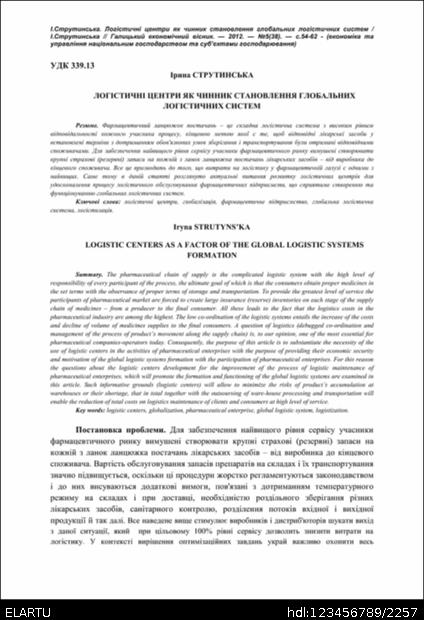Bu öğeden alıntı yapmak, öğeye bağlanmak için bu tanımlayıcıyı kullanınız:
http://elartu.tntu.edu.ua/handle/123456789/2257

| Başlık: | Логістичні центри як чинник становлення глобальних логістичних систем |
| Diğer Başlıklar: | Logistic centers as a factor of the global logistic systems formation |
| Yazarlar: | Strutyns’ka, Iryna Струтинська, Ірина Володимирівна |
| Bibliographic description (Ukraine): | І.Струтинська. Логістичні центри як чинник становлення глобальних логістичних систем / І.Струтинська // Галицький економічний вісник. — 2012. — №5(38). — с.54-62 - (економіка та управління національним господарством та суб’єктами господарювання) |
| Yayın Tarihi: | 2012 |
| Date of entry: | 28-May-2013 |
| Yayıncı: | Тернопільський національний технічний університет ім. Івана Пулюя |
| Place of the edition/event: | Тернопіль, Україна |
| UDC: | 339.13 |
| Anahtar kelimeler: | логістичні центри глобалізація фармацевтичне підприємство глобальна логістична система, логістизація logistic centers globalization pharmaceutical enterprise global logistic system logistization |
| Özet: | Фармацевтичний ланцюжок постачань – це складна логістична система з високим рівнем відповідальності кожного учасника процесу, кінцевою метою якої є те, щоб відповідні лікарські засоби у встановлені терміни з дотриманням обов'язкових умов зберігання і транспортування були отримані відповідними споживачами. Для забезпечення найвищого рівня сервісу учасники фармацевтичного ринку вимушені створювати крупні страхові (резервні) запаси на кожній з ланок ланцюжка постачань лікарських засобів – від виробника до кінцевого споживача. Все це призводить до того, що витрати на логістику у фармацевтичній галузі є одними з найвищих. Саме тому в даній статті розглянуто актуальні питання розвитку логістичних центрів для удосконалення процесу логістичного обслуговування фармацевтичних підприємств, що сприятиме створенню та функціонуванню глобальних логістичних систем. The pharmaceutical chain of supply is the complicated logistic system with the high level of responsibility of every participant of the process, the ultimate goal of which is that the consumers obtain proper medicines in the set terms with the observance of proper terms of storage and transportation. To provide the greatest level of service the participants of pharmaceutical market are forced to create large insurance (reserve) inventories on each stage of the supply chain of medicines – from a producer to the final consumer. All these leads to the fact that the logistics costs in the pharmaceutical industry are among the highest. The low co-ordination of the logistic systems entails the increase of the costs and decline of volume of medicines supplies to the final consumers. A question of logistics (debugged co-ordination and management of the process of product’s movement along the supply chain) is, to our opinion, one of the most essential for pharmaceutical companies-operators today. Consequently, the purpose of this article is to substantiate the necessity of the use of logistic centers in the activities of pharmaceutical enterprises with the purpose of providing their economic security and motivation of the global logistic systems formation with the participation of pharmaceutical enterprises. For this reason the questions about the logistic centers development for the improvement of the process of logistic maintenance of pharmaceutical enterprises, which will promote the formation and functioning of the global logistic systems are examined in this article. Such informative grounds (logistic centers) will allow to minimize the risks of product’s accumulation at warehouses or their shortage, that in total together with the outsoursing of ware-house processing and transportation will enable the reduction of total costs on logistics maintenance of clients and consumers at high level of service. |
| URI: | http://elartu.tntu.edu.ua/handle/123456789/2257 |
| Copyright owner: | © „Галицький економічний вісник“ |
| Publications status : | Опубліковано раніше |
| Content type: | Article |
| Koleksiyonlarda Görünür: | Галицький економічний вісник, 2012, № 5 (38) |
Bu öğenin dosyaları:
| Dosya | Açıklama | Boyut | Biçim | |
|---|---|---|---|---|
| GEB_2012_v38_No5-I_Strutynska-Logistic_centers_as_a_factor_of_global__54.pdf | 223,61 kB | Adobe PDF | Göster/Aç | |
| GEB_2012_v38_No5-I_Strutynska-Logistic_centers_as_a_factor_of_global__54.djvu | 180,24 kB | DjVu | Göster/Aç | |
| GEB_2012_v38_No5-I_Strutynska-Logistic_centers_as_a_factor_of_global_54__COVER.png | 177,86 kB | image/png | Göster/Aç |
DSpace'deki bütün öğeler, aksi belirtilmedikçe, tüm hakları saklı tutulmak şartıyla telif hakkı ile korunmaktadır.